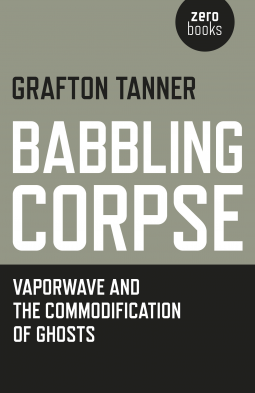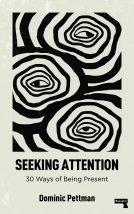
Babbling Corpses
Vaporwave and the Commodification of Ghosts
by Grafton Tanner
This title was previously available on NetGalley and is now archived.
Send NetGalley books directly to your Kindle or Kindle app
1
To read on a Kindle or Kindle app, please add kindle@netgalley.com as an approved email address to receive files in your Amazon account. Click here for step-by-step instructions.
2
Also find your Kindle email address within your Amazon account, and enter it here.
Pub Date 24 Jun 2016 | Archive Date 27 Jul 2016
John Hunt Publishing Ltd | Zero Books
Description
In the age of global capitalism, vaporwave celebrates and undermines the electronic ghosts haunting the nostalgia industry.
Ours is a time of ghosts in machines, killing meaning and exposing the gaps inherent in the electronic media that pervade our lives.
Vaporwave is an infant musical micro-genre that foregrounds the horror of electronic media's ability to appear – as media theorist Jeffrey Sconce terms it – "haunted."
Experimental musicians such as INTERNET CLUB and MACINTOSH PLUS manipulate Muzak and commercial music to undermine the commodification of nostalgia in the age of global capitalism while accentuating the uncanny properties of electronic music production. Babbling Corpse reveals vaporwave's many intersections with politics, media theory, and our present fascination with uncanny, co(s)mic horror.
The book is aimed at those interested in global capitalism's effect on art, musical raids on mainstream "indie" and popular music, and anyone intrigued by the changing relationship between art and commerce
Available Editions
| EDITION | Paperback |
| ISBN | 9781782797593 |
| PRICE | £9.99 (GBP) |
Average rating from 4 members
Featured Reviews
 Librarian 17772
Librarian 17772
Like the other books I've seen from this publisher, it's a blend of interesting information and insights about a musical microgenre surrounded by a lot of talk about the usual postmodernists and cultural theorists. It also draws on another book from the series, Mark Fisher's Ghosts of My Life. I prefer that book, because Fisher is, I suspect, an older and more experienced writer and because he spends more time on the music. Tanner comes across as young and enthusiastic and bursting to make use of all the reading he's done. Considering he's writing about something as obscure about vaporwave music, more of a focus on the music and less on Jameson and Derrida would have resulted in a more useful book for music fans. But that's not the real target audience. Young academics concerned with postmodernism and the crisis of capitalism are.
Still, this reader -- who did his BA so long ago that no one ever mentioned any French theorists in class -- found more than enough here to keep me reading. I've also gone and tracked down some vaporwave, or at least tangentially related stuff -- the boundaries seem a bit fluid. So far I'm enjoying HKE, Darkpyramid, and t e l e p a t h テレパシー能力者. Worthwhile, then. And, so help me, I've gone and bought another music-related book from the same publisher, which also looks heavily laden with theory, but the core subject looks so darn interesting....
 David W, Media/Journalist
David W, Media/Journalist
We are owned and operated by The Virtual Mall
The concept of vaporwave is a function of franken music. Taking samples of other music, endlessly repeating sounds, words and phrases either spoken or musical, and slapping them all together into an mp3 package, vaporwave can infuriate, bore or be completely ignored. It can have zero musical value, or appear as outright theft. It is a rebellion of sorts against the powerful commercial music establishment that dictates our tastes. To Grafton Tanner, it is the poster child of the decline and fall of western civilization. It is at very least yet another symptom.
Vaporwave music can be created by anyone, alone, with a computer. No musical talent, training or inspiration is necessary, and rarely is any evident. Ironically, the best vaporwave takes a community, a very real group of people to make it work. Unlike the world of social media, these artists actually had to get together. It was a revelation, they say. Beyond this small exception, we find ourselves more and more alone, perhaps followed by a troll online, posting here and there, continually proving there is nothing social about social media.
It all boils down to rampant, uncontrolled capitalism. Capitalism has not delivered us from oppression, Tanner says. We mock it, we vilify it, but it owns us, bores us, and drains us. It is depressingly smothering. Tanner rightly points out that while Americans live in fear of attack, of drugs, of crime. of economic turmoil, of government intrusion – “the culture industry still peddles ludicrous, infantile fantasies”. The standard cinematic diet is of comic superheroes meant for teenage boys in the 1950s. There is so much bad, retrospective music everywhere it is invisible, and some of us have given up on it entirely.
In this brief but densely packed book, Tanner expresses his frustration with a series of pop culture examples and insights on American Kultur. His writing is straightforward, simple, economical and powerful. He acknowledges and appreciates pop culture critics from the Left. His own observations are far clearer and deeper than the usual pabulum of the blogosphere and forum comments. He is perceptive, challenging, and authoritative. His positions are well founded. Thinking is required if you venture here. It was a distinct pleasure to read this little book.
Grafton Tanner is a new voice very much worth listening to.
David Wineberg
Readers who liked this book also liked:
Dominic Pettman
Health, Mind & Body, Nonfiction (Adult), Politics & Current Affairs








